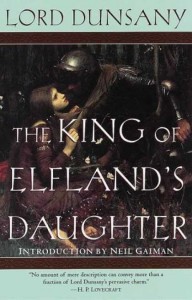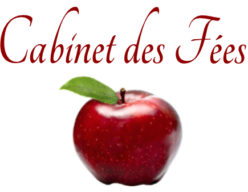The King of Elfland’s Daughter
by Lord Dunsany, Del Rey Impact edition 1999
Reviewed by Deborah J. Brannon
 Anyone truly interested in the heritage of modern fantasy literature can hardly have missed hearing the name Lord Dunsany: for it is this man, Edward John Moreton Drax Plunkett, 18th Baron of Dunsany, who was one of the pioneers of the genre. Born in London on July 24th, 1878, he went on to be a marvelous jack of all trades — among them pistol-shooting champion, remarkable chess player, loyal and experienced soldier, and prolific writer — who produced over sixty books of plays, poems, essays, and stories during his lifetime. One of these books is The King of Elfland’s Daughter, written in 1924.
Anyone truly interested in the heritage of modern fantasy literature can hardly have missed hearing the name Lord Dunsany: for it is this man, Edward John Moreton Drax Plunkett, 18th Baron of Dunsany, who was one of the pioneers of the genre. Born in London on July 24th, 1878, he went on to be a marvelous jack of all trades — among them pistol-shooting champion, remarkable chess player, loyal and experienced soldier, and prolific writer — who produced over sixty books of plays, poems, essays, and stories during his lifetime. One of these books is The King of Elfland’s Daughter, written in 1924.
The King of Elfland’s Daughter begins with the plan of the Parliament of Erl to get themselves a “magic lord,” for they all desire their beloved valley to become great in the minds and memories of all men. Bowing to their fervent wish and sure of their foolishness, their Lord sends his only son into Elfland to find a bride there. Finding not only a bride but that a surprisingly long time has passed in the “fields we know,” young Alveric returns to rule in his father’s place and begets a son with his fair Lirazel: a son who has both the blood of the fields we know and of Elfland, beyond our ken. What follows is strange and terrible, earthly and fey. Lirazel blows away, unicorns are hunted for sport, all manner of fiendish fairies cavort among the homes of men, Alveric becomes a grey wanderer, and a witch sweeps out the world. There are men of God also, holding back the torrent of Elfland. There is regret, fear, and that curious human quality of not seeing what is right in front of our eyes. And there is great love, unbounded by space and time.
The opening of the novel seems to engage heavily with balladic traditions, especially that of repetition. If one were to forget the strong oral backgrounds of folklore (which markedly inform the text as well) and the prevalence of ballads in the United Kingdom, one might well become overly weary of the phrase “fields we know,” repeated ad nauseam throughout the text. However, I dare say that this refrain, especially when spoken aloud, would serve to anchor the difference between our world and Elfland more firmly in readers’ minds through evocative private connotation, even more so where this phrase is paired so closely with natural description of the native landscapes.
For such a relatively slender volume, The King of Elfland’s Daughter is startingly complex in its number of intertwining storylines. Indeed, it’s at least four stories in one: the Parliament’s quest to make their valley great (embroiling them in fear-inducing strangeness and forgotten greatness), Alveric’s quest for his love (twice over, the second time bowed by madness and loss), young Orion’s quest for his identity somewhere between Earth and Elfland (and his mother, so long lost to him), and the King of Elfland’s quest to have a world unchanging (his daughter safe within it). One could argue for a further two main storylines, as well, in Elfland’s prickly love affair with change and stasis, only being able to survive by bringing humanity to the very heart of it; and, of course, the witch’s engagement with all as agent of the liminal spaces (spaces of impossible love, despairing hearts, and the edge of Elfland).
Although stylistically archaic by today’s standards, this novel and Dunsany himself are well worth the regard and admiration directed at both. Among those inspired, simply from perusal of the blurbs provided for the Del Rey edition, are H.P. Lovecraft, Andre Norton, Ellen Kushner, Delia Sherman, and Neil Gaiman. Gaiman himself provided an Introduction to this edition, enthusing “…and he wrote The King of Elfland’s Daughter, a fine, strange, almost forgotten novel, as too much of Dunsany’s unique work is forgotten. If this book alone were all he had written, it would have been enough.”
It should be noted as well, that, in his own day, Dunsany’s contemporaries and friends included W.B. Yeats, Lady Gregory, and Rudyard Kipling. In fact, he holds the distinction of being the only writer for whom W.B. Yeats edited a collection of stories. (Those wishing to learn more about Dunsany’s career and associates, as well as many fascinating tidbits concerning his life and character, would do well to start with the article located on Wikipedia.)
It is well worth the time of any afficionado of fantastic literature to seek out the works of Lord Dunsany, particuarly The King of Elfland’s Daughter: to revel in ornamental language and engagingly original fantasies, as well as to educate themselves on the pioneering works of their genre. As a last testament to the enduring value of his writing, I heartily recommend you to any online bookstore, where you will find a selection of Dunsany works awaiting you on the virtual shelves even now, the better part of a century past his prime.

